小学英语教案北师大版五年级下册英语UnitDayand night 教案
五年级下册英语教案 Unit9 Day and night Lesson1 北师大版(三起)
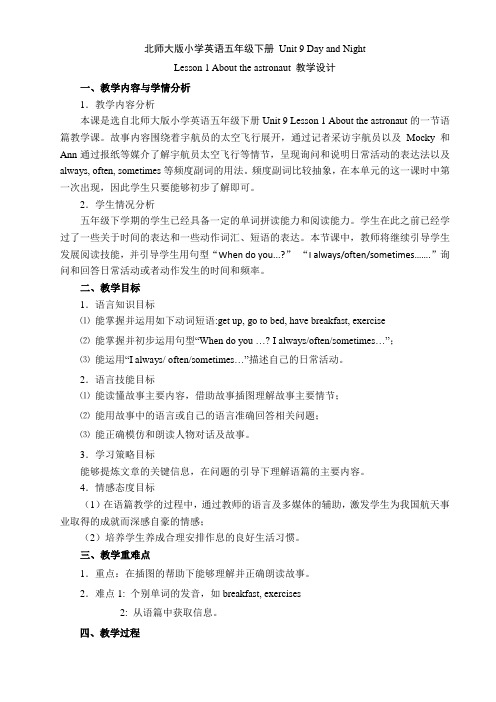
北师大版小学英语五年级下册Unit 9 Day and NightLesson 1 About the astronaut 教学设计一、教学内容与学情分析1.教学内容分析本课是选自北师大版小学英语五年级下册Unit 9 Lesson 1 About the astronaut的一节语篇教学课。
故事内容围绕着宇航员的太空飞行展开,通过记者采访宇航员以及Mocky 和Ann通过报纸等媒介了解宇航员太空飞行等情节,呈现询问和说明日常活动的表达法以及always, often, sometimes等频度副词的用法。
频度副词比较抽象,在本单元的这一课时中第一次出现,因此学生只要能够初步了解即可。
2.学生情况分析五年级下学期的学生已经具备一定的单词拼读能力和阅读能力。
学生在此之前已经学过了一些关于时间的表达和一些动作词汇、短语的表达。
本节课中,教师将继续引导学生发展阅读技能,并引导学生用句型“When do you...?”“I always/often/sometimes…….”询问和回答日常活动或者动作发生的时间和频率。
二、教学目标1.语言知识目标⑴能掌握并运用如下动词短语:get up, go to bed, have breakfast, exercise⑵能掌握并初步运用句型“Whe n do you …? I always/often/sometimes…”;⑶能运用“I always/ often/sometimes…”描述自己的日常活动。
2.语言技能目标⑴能读懂故事主要内容,借助故事插图理解故事主要情节;⑵能用故事中的语言或自己的语言准确回答相关问题;⑶能正确模仿和朗读人物对话及故事。
3.学习策略目标能够提炼文章的关键信息,在问题的引导下理解语篇的主要内容。
4.情感态度目标(1)在语篇教学的过程中,通过教师的语言及多媒体的辅助,激发学生为我国航天事业取得的成就而深感自豪的情感;(2)培养学生养成合理安排作息的良好生活习惯。
北师大版小学五年级英语下册教案5篇

北师大版小学五年级英语下册教案5篇在教学中,谨慎备课,谨慎阅读各种教科参考书,结合自己的教学经历与学生的学习状况,谨慎编写好教案制定好教学打算,并不断地加以改善修改。
在传授学生学问的同时,关怀爱惜学生,才能更好的与学生进展沟通教学。
以下是我带来的北师大版小学五年级英语下册教案内容,感谢您的阅读,盼望能协助到您!北师大版小学五年级英语下册教案1学习目标1. 能听、说、读、写单词“sing”,“song”,“kung fu”,“dance”和词组“sing English songs”,“playthe pipa”,“do kung fu”,“draw cartoons”。
2. 能在创设的实际情景中敏捷运用句型“What can you do?”,“I can …”。
3. 能听懂、会唱歌曲“What can you do?”。
4. 能完成“Do a survey”局部的对话任务。
5. 鼓舞学生了解身边同学的实力,做生活中的有心人。
学习重难点1. 能听、说、读、写单词“sing”,“song”,“kung fu”,“dance”和词组“sing English songs”,“playthe pipa”,“do kung fu”,“draw cartoons”。
2. 能在创设的实际情景中敏捷运用句型“What can you do?”,“I can …”。
教学难点1. 新词汇和词组的学习。
2. 能在创设的实际情景中敏捷运用句型“What can you do?”,“I can …”。
教学过程二次备课一、课前热身(Warm-up)1. Free talkT: Good morning, everyone. Welcome back to school. How are you today?Ss: Fine, thank you. And you?T: I’m fine, too. Are you ready for our class?Ss: Yes.2. 热身活动T: Now let’s do some warming-up practice. All of you, listen to me, please.Stand up and follow me. Run, I can run (read, jump, swim, fly, clean, draw…).二、课前预习(Preview)学习歌曲“What can you do?”T: You can jump, run, swim … You’re so great.Now let’s learn a song called“What can you do?”.第一次播放歌曲录音,全班学生跟着录音唱歌曲。
北师大版-英语-五年级下册-Unit 9 Day and Night Lesson2名师教案
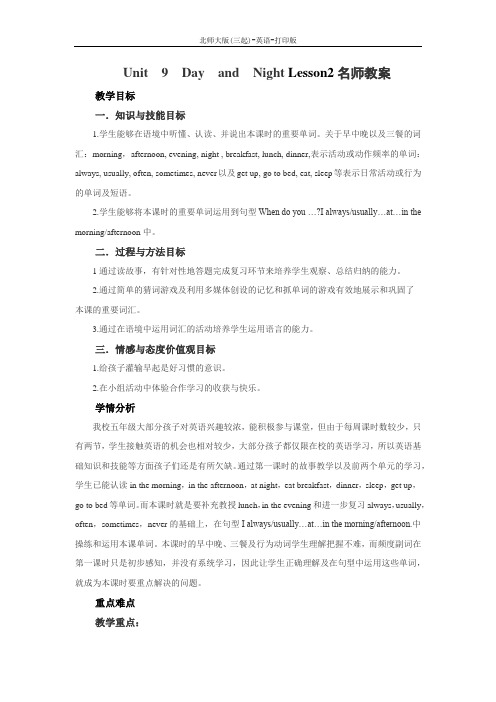
Unit9Day and Night Lesson2名师教案教学目标一.知识与技能目标1.学生能够在语境中听懂、认读、并说出本课时的重要单词。
关于早中晚以及三餐的词汇:morning,afternoon, evening, night , breakfast, lunch, dinner,表示活动或动作频率的单词:always, usually, often, sometimes, never以及get up, go to bed, eat, sleep等表示日常活动或行为的单词及短语。
2.学生能够将本课时的重要单词运用到句型When do you …?I always/usually…at…in the morning/afternoon中。
二.过程与方法目标1通过读故事,有针对性地答题完成复习环节来培养学生观察、总结归纳的能力。
2.通过简单的猜词游戏及利用多媒体创设的记忆和抓单词的游戏有效地展示和巩固了本课的重要词汇。
3.通过在语境中运用词汇的活动培养学生运用语言的能力。
三.情感与态度价值观目标1.给孩子灌输早起是好习惯的意识。
2.在小组活动中体验合作学习的收获与快乐。
学情分析我校五年级大部分孩子对英语兴趣较浓,能积极参与课堂,但由于每周课时数较少,只有两节,学生接触英语的机会也相对较少,大部分孩子都仅限在校的英语学习,所以英语基础知识和技能等方面孩子们还是有所欠缺。
通过第一课时的故事教学以及前两个单元的学习,学生已能认读in the morning,in the afternoon,at night,eat breakfast,dinner,sleep,get up,go to bed等单词。
而本课时就是要补充教授lunch,in the evening和进一步复习always,usually,often,sometimes,never的基础上,在句型I always/usually…at…in the morning/afternoon.中操练和运用本课单词。
北师大五年级下册英语全册教案
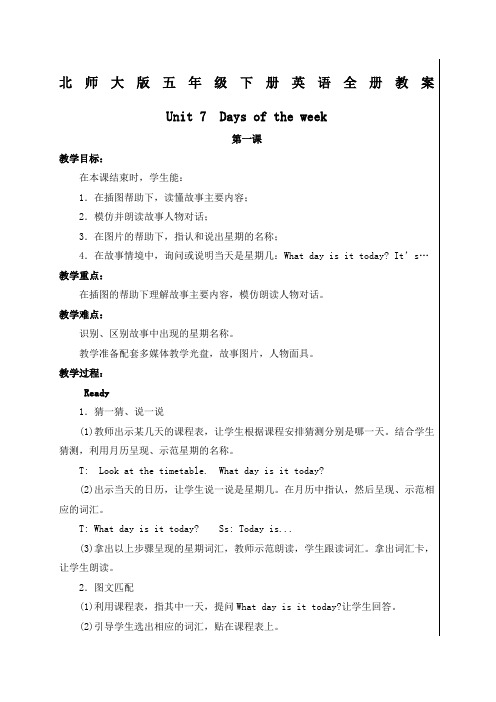
北师大版五年级下册英语全册教案Unit 7 Days of the week第一课教学目标:在本课结束时,学生能:1.在插图帮助下,读懂故事主要内容;2.模仿并朗读故事人物对话;3.在图片的帮助下,指认和说出星期的名称;4.在故事情境中,询问或说明当天是星期几:What day is it today? I t’s…教学重点:在插图的帮助下理解故事主要内容,模仿朗读人物对话。
教学难点:识别、区别故事中出现的星期名称。
教学准备配套多媒体教学光盘,故事图片,人物面具。
教学过程:Ready1.猜一猜、说一说(1)教师出示某几天的课程表,让学生根据课程安排猜测分别是哪一天。
结合学生猜测,利用月历呈现、示范星期的名称。
T: Look at the timetable. What day is it today?(2)出示当天的日历,让学生说一说是星期几。
在月历中指认,然后呈现、示范相应的词汇。
T: What day is it today? Ss: Today is...(3)拿出以上步骤呈现的星期词汇,教师示范朗读,学生跟读词汇。
拿出词汇卡,让学生朗读。
2.图文匹配(1)利用课程表,指其中一天,提问What day is it today?让学生回答。
(2)引导学生选出相应的词汇,贴在课程表上。
T: Which one is Monday?3.师生问答(1)拿出课程表或日历,指其中的日子,让学生说出是星期几。
(2)指当天的日期,让学生说一说是星期几。
the Story1.导入故事呈现故事第一幅插图,引导学生看图猜测故事发生的时间和人物准备做的事情。
T: Look at the picture. What time is it? What are Kan and Ann going to do? What does Mocky want to do?2.学习故事(1)师生问答,预测分享故事带领学生一起看插图1,指Mocky说Mocky的问话,引导学生回答Ken和Ann是否能和Mocky一起玩。
北师大版-英语-五年级下册-Unit 9 Day and Night第二课 同步教案
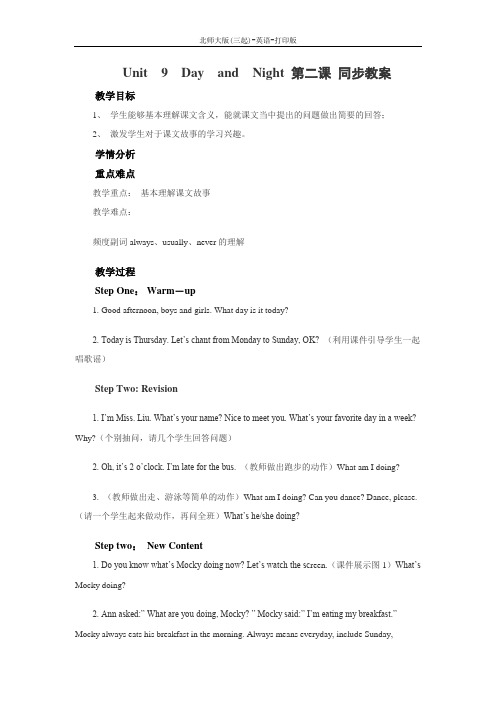
Unit9Day and Night 第二课同步教案教学目标1、学生能够基本理解课文含义,能就课文当中提出的问题做出简要的回答;2、激发学生对于课文故事的学习兴趣。
学情分析重点难点教学重点:基本理解课文故事教学难点:频度副词always、usually、never的理解教学过程Step One: Warm-up1. Good afternoon, boys and girls. What day is it today?2. Today is Thursday. Let’s chant from Monday to Sunday, OK? (利用课件引导学生一起唱歌谣)Step Two: Revision1. I’m Miss. Liu. What’s your name? Nice to meet you. What’s your favorite day in a week? Why?(个别抽问,请几个学生回答问题)2. Oh, it’s 2 o’clock. I’m late for the bus. (教师做出跑步的动作)What am I doing?3. (教师做出走、游泳等简单的动作)What am I doing? Can you dance? Dance, please. (请一个学生起来做动作,再问全班)What’s he/she doing?Step two:New Content1. Do you know what’s Mocky doing now? Let’s watch the sc reen.(课件展示图1)What’s Mocky doing?2. Ann asked:” What are you doing, Mocky? ” Mocky said:” I’m eating my breakfast.” Mocky always eats his breakfast in the morning. Always means everyday, include Sunday,Monday, Tuesday, Wednesday, Thursday, Friday, Saturday and all the holidays. Read after me, always, use your fingers, a-l-w-a-y-s, always. Read after me, I always eat breakfast in the morning.3. (课件展示图2)Now, Mocky wants to know what time does Ann eat her breakfast. So he asked:” When do you eat breakfast, Ann?” Ann answered:”breakfast in the morning, too.” When equals to what time. (板书提示)4. When do you eat breakfast? OK, please ask your partner when does he or she eat breakfast? Practice in pairs. (引导学生两人小组进行对话练习)Who want to have a try? Hands up. (请几个学生回答问题)5. Do you always eat breakfast in the morning? On Saturdays, I don’t eat breakfast in the morning. I sleep in the morning on holidays. So I could only say: I usually eat breakfast in the morning. Usually means not always.6. (课件展示图6)Ann and Mocky go to visit Uncle Booky. Ann wanted to know what does Uncle Booky do in the morning. Do you want to know? How does Mocky answer her? Watch the screen. Let’s read the sentence together. He usually reads a book. What do you do in the morning?(询问几个学生)Now you can ask your partner what does he or she do in the morning or afternoon, practice in pairs.(引导学生进行两人练习,并请两组学生起来展示对话)7. Ken, Ann and Mocky go to visit Uncle Booky. Now, they are at Uncle Booky’s house. But where is Uncle Booky?8. (课件展示图9)Do they find Uncle Booky? Where is he? Does Mocky know? No, he doesn’t know. He says:” I don’t know. He’s usually at home in the morning.”9. (课件展示图10)Uncle Booky is usually at home in the morning, when does he go to the store? Ken wants to know, so he asks. Mocky answered:” He o ften goes to the store in the afternoon. He never goes in the morning.” Often and usually are almost the same meaning.(手势讲解差不多相同)Never means no, not.(加上表情、手势强调never,贴片讲解)Let’s read the two sentences together. He often goes to the store in the afternoon. He never goes in the morning.10. Where is Uncle Booky? What’s he doing now? Can you guess?(请两三个学生起来猜Uncle Booky到底在做什么)Look, he’s sleeping. He sometimes sleeps in the morning! Uncle Booky usually reads a book in the morning, but that day, he sleeps. So he sometimes sleeps in the morning.Step three: Practice1. Do you like the story? I like it because it’s funny. Let’s watch it from the very beginning. After you watch the whole story, please answer my questions.(课件从头播放故事动画)2. Here are the questions for you.(课件展示提问的几个问题)You can talk with your partner, and then give me your answer.(引导学生小组之内根据课文内容讨论问题,然后进行问题的回答)3. After class, please read the story after the tape. Next time, please tell the story to us, OK? That’s all for today. Goodbye, boys and girls!。
小学五下北师大英语Unit 9 Day and nightLesson 2 学案
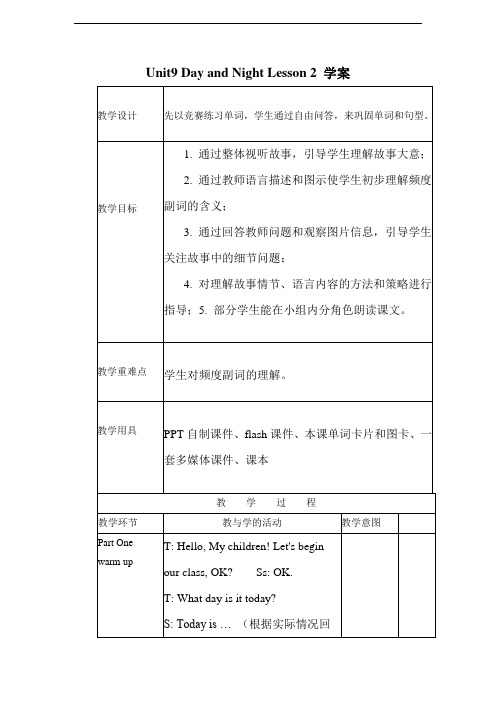
出现错误,教师可适当予以纠正。)
操练若干组后继续…… 设计
意图:复习前两个单元主要句型的
同时,自然导入新课。
Part
TwoStep 2 复习故事内容
presentation
1. 回顾 lesson1 故事内容。
T: Today is Sunday. So they
have time to play with Mocky. What
(注:学生对于 morning, afternoon,
evening 这三个词并不陌生,教师稍
加提醒即可唤起学生记忆。)
T: 教师指着刚刚回答问题的学生
问 What does he/she usually do on
Sunday?
Ss: He/ She goes to the … (学生说动
词第三人称单数的变化时有可能会
do they want to do next? Let's watch the story. 教师播放课文光盘一 遍,学生视听。
T: What do they want to do next?
Ss: Visit Uncle Booky. T: Good. 2. 关注并谈论图 1—3 的细节信 息。
breakfast. (边说边用 PPT 展示
极性
Mocky 正在吃早饭的图片,用图片
和语言解释 breakfast 的意思)
(Breakfast means the things you eat
in the morning. Such as eggs, porridge and something like these(2) 通过回答问题,理解图 1-3 的主要 事件信息。 T: OK, this time please open your books and read pictures 1,2 and 3 carefully .Then answer the following questions. (教师用 PPT 展示所提 出的问题) ①Does Mocky always eat breakfast in the morning? ②Does Mocky always eat breakfast so late? ③When (=What time) does Ann eat breakfast? 注:在呈现问题的过程中,教师解 释、教授 always, late 等词。如: Mocky eats breakfast in the morning on Monday,Tuesday, Wednesday, Thursday, Friday, Saturday and Sunday. So we can say Mocky always eats breakfast in the morning.
五年级下册英语导学案-Unit 9 Day and night Lesson 1 丨北师大版(三起)
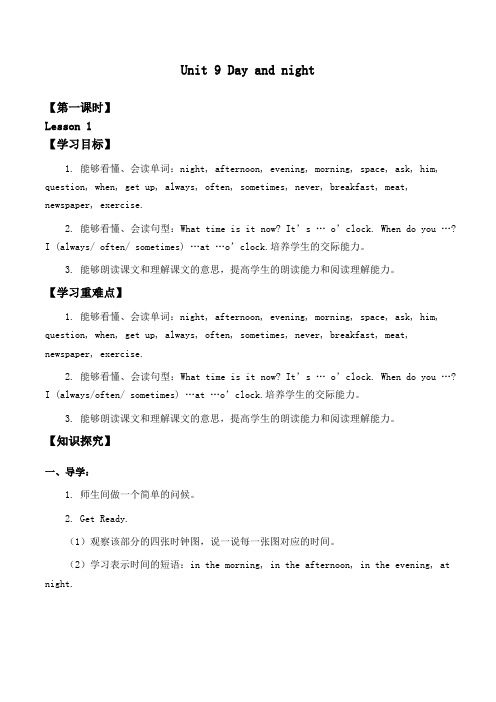
Unit 9 Day and night【第一课时】Lesson 1【学习目标】1. 能够看懂、会读单词:night, afternoon, evening, morning, space, ask, him, question, when, get up, always, often, sometimes, never, breakfast, meat, newspaper, exercise.2. 能够看懂、会读句型:What time is it now? It’s … o’clock. When do you …?I (always/ often/ sometimes) …at …o’clock.培养学生的交际能力。
3. 能够朗读课文和理解课文的意思,提高学生的朗读能力和阅读理解能力。
【学习重难点】1. 能够看懂、会读单词:night, afternoon, evening, morning, space, ask, him, question, when, get up, always, often, sometimes, never, breakfast, meat, newspaper, exercise.2. 能够看懂、会读句型:What time is it now? It’s … o’clock. When do you …?I (always/often/ sometimes) …at …o’clock.培养学生的交际能力。
3. 能够朗读课文和理解课文的意思,提高学生的朗读能力和阅读理解能力。
【知识探究】一、导学:1. 师生间做一个简单的问候。
2. Get Ready.(1)观察该部分的四张时钟图,说一说每一张图对应的时间。
(2)学习表示时间的短语:in the morning, in the afternoon, in the evening, at night.二、知识构建:1. 依次观察课文的插图,说一说这个故事大概讲了什么。
五年级下英语教案Unit9Dayandnight_北师大版(三起)

Unit 9 Day and night(第一课时)教学目标:(1)通过学习,能够用英语简单描述自己一天的活动。
(2)对学生进行养成安排良好作息时间的教育。
(3)培养学生的综合素质及英语能力。
教学重点:1.掌握下列这些句型:When do you always/usually/often/sometimes/never/ eat breakfast?I __________ eat breakfast__________.2.When does he always/usually/often/sometimes/ do in the morning?He_______ goes to the store___________.教学难点: 能在相关的语境中正确运用所学句型。
教具准备: 教学卡片、多煤体等。
教学过程:一、导入师:What time do you go to school ?生:I go to school_____________.二、学习生词always、 usually、 often、 sometimes、 never。
1).学习生词 always师:What time do you get up ?生:I get up at ______________.师:Yes, I always get up at six .师再问:When do you get up ? (When means what time)师出示when生词卡片,学习生词when。
师再问另外几个同学此句型,师还用 I always ______________.句型回答。
师出示always 生词卡片,学习生词always。
2). 用同样方法的学习 usually、 often。
3). 学习生词 sometimes 师: When do you go to bed every day ?生: I go to bed at __________.师: Oh , you go to bed too late. So you sometimes go to school late . 师出示sometimes生词卡片,学习生词sometimes.4). 学习生词 never.师: When do you go to bed every day ?生: I go to bed at __________.5)师: Oh , you go to bed too early. So you never go to school late .师出示never 生词卡片,学习生词never.5). 跟录音认读生词always、 usually、 often、 sometimes、 never。
小学英语教案 北师大版五年级下册英语Unit9 Day and night 教案
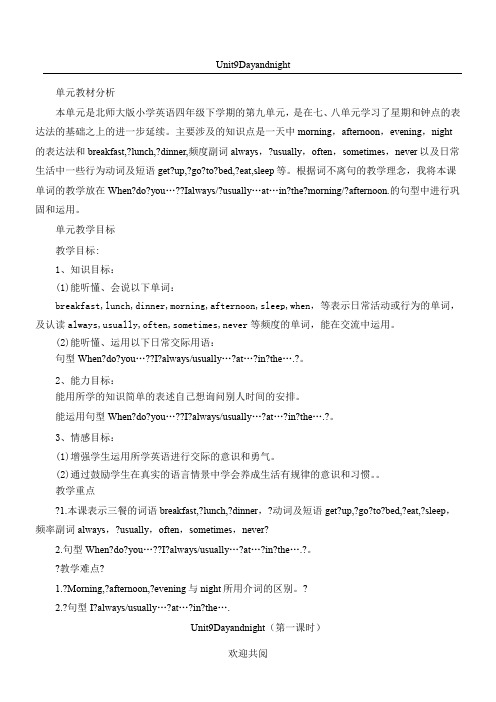
Unit9Dayandnight单元教材分析本单元是北师大版小学英语四年级下学期的第九单元,是在七、八单元学习了星期和钟点的表达法的基础之上的进一步延续。
主要涉及的知识点是一天中morning,afternoon,evening,night 的表达法和breakfast,?lunch,?dinner,频度副词always,?usually,often,sometimes,never以及日常生活中一些行为动词及短语get?up,?go?to?bed,?eat,sleep等。
根据词不离句的教学理念,我将本课频率副词always,?usually,often,sometimes,never?2.句型When?do?you…??I?always/usually…?at…?in?the….?。
?教学难点?1.?Morning,?afternoon,?evening与night所用介词的区别。
?2.?句型I?always/usually…?at…?in?the….Unit9Dayandnight(第一课时)知识目标:1、学习新单词:breakfast,lunch,dinner,morning,afternoon,sleep,when,等表示日常活动或行为的单词,及认读always,usually,often,sometimes,never等频度的单词,能在交流中运用。
2、学习句型:Whendoyou(getup)?I(always)getupat(seveno’clock).能够在交流加以运用。
3、学习故事,初步感知句型,理解内容。
能力目标:1、能初步认读运用单词及句型2、能够理解故事内容,并朗读课文故事情感目标:教学重点:能够运用句型:Whendoyou(…)?(...o’clock).来描述自己做某事的时间和频率。
12,等表示日常活动或等频度的单词,能在交流中运用。
2)getupat(seveno’clock).能够在交流加以运用。
最新五年级英语下册Unit9《Dayandnight》 2北师大版(三起)优选教学课件

Unit 9
Day
and
night
nightAt night:在夜间
[naɪt]
夜间
afternoon In the afternoon:在下午 Good afternoon:下午好
- 1、下载文档前请自行甄别文档内容的完整性,平台不提供额外的编辑、内容补充、找答案等附加服务。
- 2、"仅部分预览"的文档,不可在线预览部分如存在完整性等问题,可反馈申请退款(可完整预览的文档不适用该条件!)。
- 3、如文档侵犯您的权益,请联系客服反馈,我们会尽快为您处理(人工客服工作时间:9:00-18:30)。
Unit 9 Day and night单元教材分析本单元是北师大版小学英语四年级下学期的第九单元,是在七、八单元学习了星期和钟点的表达法的基础之上的进一步延续。
主要涉及的知识点是一天中morning,afternoon,evening,night的表达法和breakfast, lunch, dinner,频度副词always,usually,often,sometimes,never以及日常生活中一些行为动词及短语get up, go to bed, eat,sleep等。
根据词不离句的教学理念,我将本课单词的教学放在 When do you…? I always/ usually…at…in the morning/ afternoon.的句型中进行巩固和运用。
单元教学目标教学目标:1、知识目标:(1)能听懂、会说以下单词:breakfast, lunch, dinner, morning, afternoon,sleep , when,等表示日常活动或行为的单词,及认读always, usually, often, sometimes, never 等频度的单词,能在交流中运用。
(2)能听懂、运用以下日常交际用语:句型When do you…? I always/usually…at…in the…. 。
2、能力目标:能用所学的知识简单的表述自己想询问别人时间的安排。
能运用句型When do you…? I always/usually…at…in the…. 。
3、情感目标:(1)增强学生运用所学英语进行交际的意识和勇气。
(2)通过鼓励学生在真实的语言情景中学会养成生活有规律的意识和习惯。
教学重点1.本课表示三餐的词语breakfast, lunch, dinner,动词及短语get up, go to bed, eat, sleep,频率副词always,usually,often,sometimes,never2.句型When do you…? I always/usually…at…in the…. 。
教学难点1. Morning, afternoon, evening与night所用介词的区别。
2. 句型I always/usually…at…in the….Unit 9 Day and night (第一课时)教学目标:知识目标:1、学习新单词:breakfast, lunch, dinner, morning, afternoon,sleep , when,等表示日常活动或行为的单词,及认读always, usually, often, sometimes, never等频度的单词,能在交流中运用。
2、学习句型:When do you (get up)? I (always) get up at (seven o’clock).能够在交流加以运用。
3、学习故事,初步感知句型,理解内容。
能力目标:1、能初步认读运用单词及句型2、能够理解故事内容,并朗读课文故事情感目标:通过课文故事的学习,培养、提升学生养成生活有规律的意识和习惯。
教学重点:能够运用句型:When do you (…)?来询问别人时间的安排,并运用I(always)(…) at (...o’clock).来描述自己做某事的时间和频率。
教学难点:单词发音:always、usually、breakfast及描述的句型。
教学目标:知识目标:1、学习新单词:breakfast, lunch, dinner,2、能够理解故事内容,并朗读课文故事morning, afternoon, sleep , when,等表示日常活动或行为的单词,及认读always, usually, often, sometimes, never等频度的单词,能在交流中运用。
2、学习句型:When do you (get up)? I (always) get up at (seven o’clock).能够在交流加以运用。
3、学习故事,初步感知句型,理解内容。
能力目标:1、能初步认读运用单词及句型情感目标:通过课文故事的学习,培养、提升学生养成生活有规律的意识和习惯。
教学重点:能够运用句型:When do you (…)?来询问别人时间的安排,并运用I(always)(…) at (..o’clock).来描述自己做某事的时间和频率。
教学难点:单词发音:always、usually、breakfast及描述的句型。
教具准备:卡片、光盘、录音机教学过程:一、复习导入:1、游戏,猜一猜:师做睡觉的动作,然后提问,What am I doing?2、指生做动作,生猜,复习以前学过的表动作的核心词汇(playing、reading、cooking、drinking、eating、Washington、painting)3、导入:今天我们要学习一些新的词汇和短语,请大家接着猜二、词汇学习:1、师做起床的动作,生猜,然后出示卡片起床图,引出短语并板书:get up,示意学生根据经验读e的发音,然后师领读,分组说中英文2、其他短语同上 eat breakfast 、go to bed分解,想前半部分和哪个词比较接近,板书bread,告诉学生记忆单词的方法:用学过的单词来认读新单词,然后分解读新单词,再连读,分组练习读。
3、利用卡片学习moring、afternoon、night、lunch、dinner4、学习频度副词:(1)师指着eat breakfast,陈述:I always eat breakfas in the morning。
生猜测句意。
然后板书频度副词:always 解释词义,然后读(2)提问:放学之后你通常和朋友一起玩吗?(3)其他词同上方法(4)板书,让生说一说其频率,然后按顺序读一读四、句型学习:(1)师继续指着eat breakfast,陈述:I always eat breakfas at seven in the morning。
When do you eat breakfast?生猜测句意(2) 操练:师生、生生When do you 。
?I 。
五、学习课文(一)看故事,了解故事的主要内容。
1、生自己结合插图及句子看故事,画出不懂的词句子,然后和同学说一说2、师点击光盘结合图提问,理解故事:What is Mocky doing ?Does he eat breakfast so late ?When does Ann eat breakfast ? Where are they going ?或:What are they going to do ?(二)听故事:1、完整听一听,听后提问:What does Uncle Booky do in the morning ?Is Uncle Booky at home ?2、生回答,然后在书上找到相应的句子读一读。
(三)读故事1、跟光盘逐句读一遍。
2、自己读,划下不会读的地方。
3、重点指导读1、2、4、8副图,随录音读,然后师领读。
六、小结:今天我们又学习了询问别人什么时间做某事的新的问法,,我们一起来读一读。
看黑板读重点句型。
七、作业:听课文录音,朗读课文。
Unit 9 Day and night (第二课时)教学目标:1、学生能够基本理解课文含义,能就课文当中提出的问题做出简要的回答;2、激发学生对于课文故事的学习兴趣。
教学重点:基本理解课文故事教学难点:频度副词always、usually、never的理解教具准备:课件,句型贴片,评比用具教学过程:Step One: Warm-up1. Good afternoon, boys and girls. What day is it today?2. Today is Thursday. Let’s chant from Monday to Sunday, OK? (利用课件引导学生一起唱歌谣)Step Two: Revision1. I’m Miss. Liu. What’s your name? Nice to meet you. What’s your favorite day in a week? Why?(个别抽问,请几个学生回答问题)2. Oh, it’s 2 o’clock. I’m late for the bus. (教师做出跑步的动作)What am I doing?3. (教师做出走、游泳等简单的动作)What am I doing? Can you dance? Dance, please. (请一个学生起来做动作,再问全班)What’s he/she doing?Step Three: New Content1. Do you know what’s Mocky doing now? Let’s watch the screen.(课件展示图1)What’s Mocky doing?2. Ann asked:” What are you doing, Mocky? ” Mocky said:” I’m eating my breakfast.” Mocky always eats his breakfast in the morning. Always means everyday, include Sunday, Monday, Tuesday, Wednesday, Thursday, Friday, Saturday and all the holidays. Read after me, always, use your fingers, a-l-w-a-y-s, always. Read after me, I always eat breakfast inthe morning.3. (课件展示图2)Now, Mocky wants to know what time does Ann eat her breakfast. So he asked:” When do you eat breakfast, Ann?” Ann answered:” I eat breakfast in the morning, too.” When equals to what time. (板书提示)4. When do you eat breakfast? OK, please ask your partner when does he or she eat breakfast? Practice in pairs. (引导学生两人小组进行对话练习)Who want to have a try? Hands up. (请几个学生回答问题)5. Do you always eat breakfast in the morning? On Saturdays, I don’t eat breakfast in the morning. I sleep in the morning on holidays. So I could only say: I usually eat breakfast in the morning. Usually means not always.6. (课件展示图6)Ann and Mocky go to visit Uncle Booky. Ann wanted to know what does Uncle Booky do in the morning. Do you want to know? How does Mocky answer her? Watch the screen. Let’s read the sentence together. He usually reads a book. What do you do in the morning?(询问几个学生)Now you can ask your partner what does he or she do in the morning or afternoon, practice in pairs.(引导学生进行两人练习,并请两组学生起来展示对话)7. Ken, Ann and Mocky go to visit Uncle Booky. Now, they are at Uncle Booky’s house. But where is Uncle Booky?8. (课件展示图9)Do they find Uncle Booky? Where is he? Does Mocky know? No, he doesn’t know. He says:” I don’t know. He’s usually at home in the morning.”9. (课件展示图10)Uncle Booky is usually at home in the morning, when does he go to the store? Ken wants to know, so he asks. Mocky answered:” He often goes to the store in the afternoon. He never goes in the morning.” Often and usually are almost the same meaning.(手势讲解差不多相同)Never means no, not.(加上表情、手势强调never,贴片讲解)Let’s read the two sentences together. He often goes to the store in the afternoon. He never goes in the morning.10. Where is Uncle Booky? What’s he doing now? Can you guess?(请两三个学生起来猜Uncle Booky到底在做什么)Look, he’s sleeping. He sometimes sleeps in the morning! Uncle Booky usually reads a book in the morning, but that day, he sleeps. So he sometimes sleeps in the morning.Step Four: Practice1. Do you like the story? I like it because it’s funny. Let’s watch it from the very beginning. After you watch the whole story, please answer my questions.(课件从头播放故事动画)2. Here are the questions for you.(课件展示提问的几个问题)You can talk with your partner, and then give me your answer.(引导学生小组之内根据课文内容讨论问题,然后进行问题的回答)3. After class, please read the story after the tape. Next time, please tell the story to us, OK? That’s all for today. Goodbye, boys and girls!Unit 9 Day and night (第三课时)教学目标:1.进一步巩固用英语简单描述自己一天的活动。
